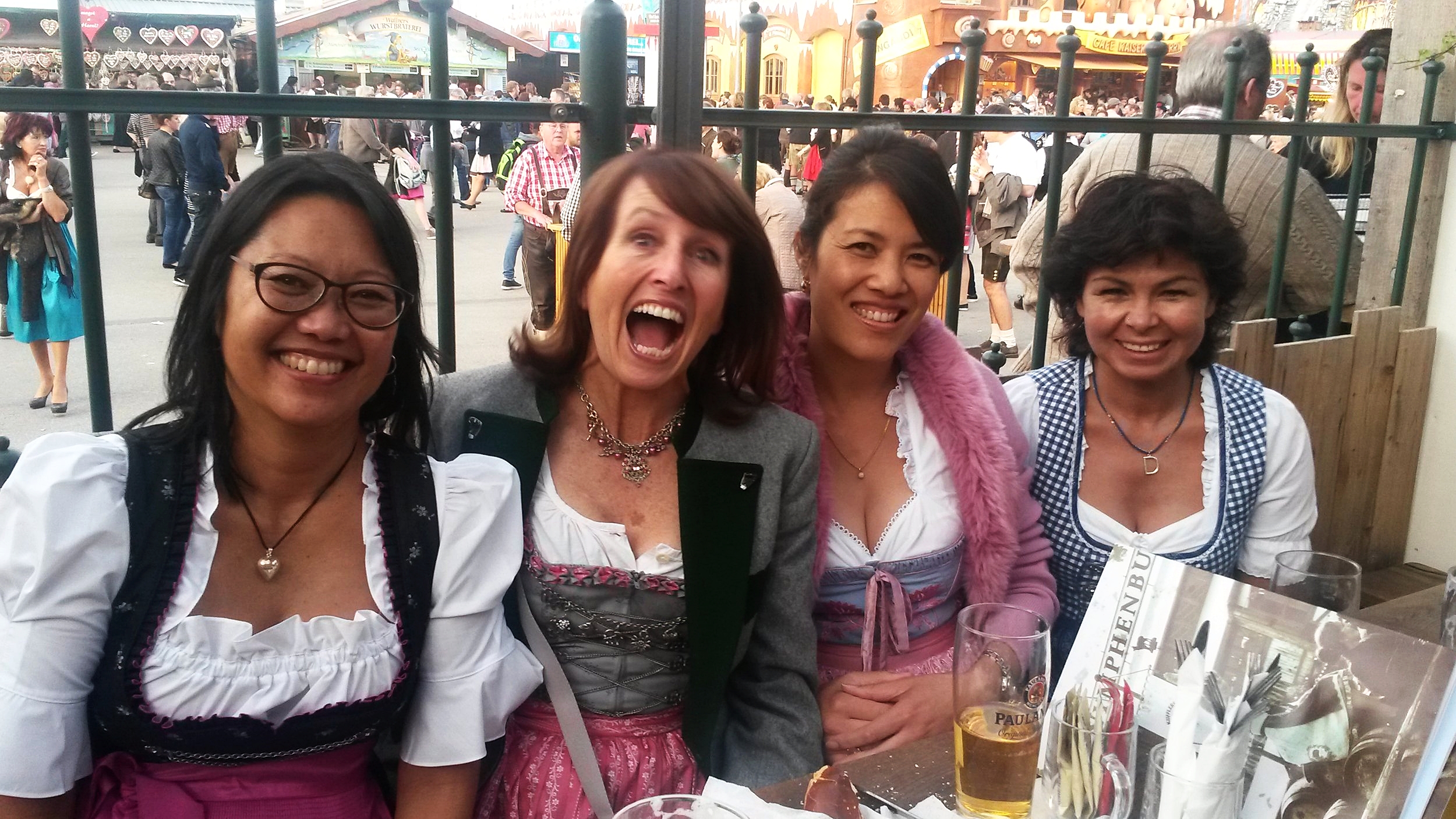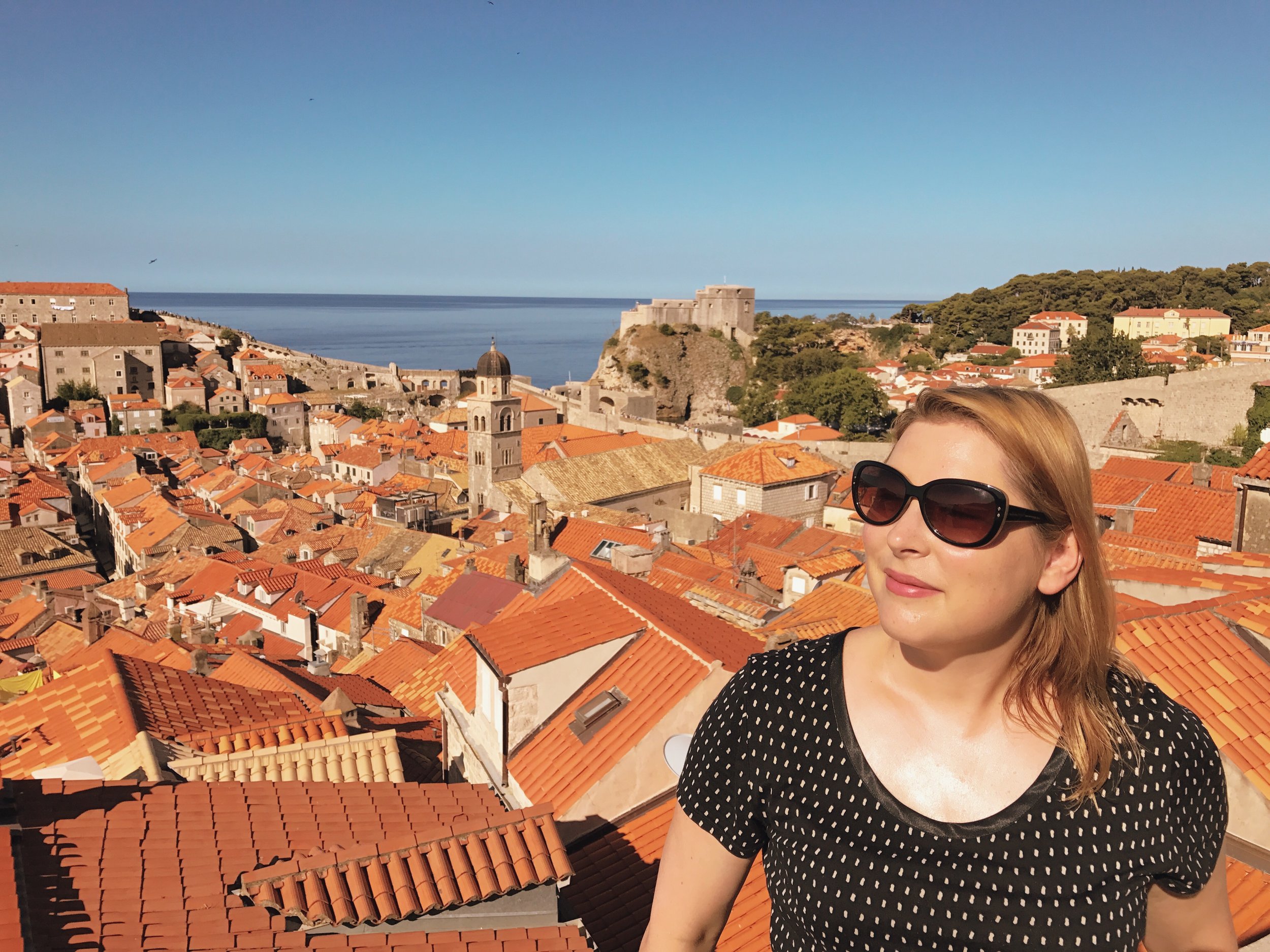Oktoberfest: Your Guide to Enjoying Munich’s Main Event (Even if You Hate Beer and Crowds)
As a vegetarian who doesn’t like beer, I never thought Oktoberfest would be an event for me. But, independent tour guide Maxine Ryder has convinced me otherwise! To start, did you know that at Munich’s massive beer event you’ll also find a Prosecco tent??
On the Postcard Academy podcast, Maxine, a British/Australian expat and Munich resident, talks about the history of Oktoberfest, the type of food and drink you’ll find there, strategies to have an amazing time, and more. Here are the highlights. Subscribe to the Postcard Academy for free to hear the whole story. (iPhone users=Apple Podcasts; Android users=Google Podcasts).
How did Oktoberfest get started?
Oktoberfest dates back to 1810, when Crown Prince Ludwig I (later to become king) married Princess Therese. They held a five-day royal wedding from Oct. 12-17 and included a horse race as part of the celebration. Munich’s citizens were invited to watch and city officials thought it was such a fun event, they’d host another race the following year for the anniversary.
Oktoberfest has been held at the same location ever since and now lasts a little over two weeks. In 2018, an estimated 7 million people will attend Oktoberfest in Munich. In a little over two weeks, they’ll drink 1.6 million gallons of beer, which is 6% alcohol and served by the liter!
Maxine getting her drink on with other ladies in dirndls. Photos here courtesy of Maxine.
Why does Oktoberfest start in September?
“When the breweries started to become more industrialized and they were producing a lot more beer, Oktoberfest was getting bigger,” Maxine says. “They decided that it would be better to pull it forward to mid-september. You can sit outside and drink and it's just a more pleasant environment in warm weather. It’s already getting chilly in October.”
Dates and times of opening hours.
Is the big Oktoberfest in Munich?
Oktoberfest takes place at Theresienwiese, an open area in a Munich borough just outside the city. It’s named after Therese von Sachsen-Hildburghausen, who married the prince and kicked off the Oktoberfest tradition more than 200 years ago. Wiese is German for ‘grassland,’ so the Theresienwiese means ‘Therese’s grassland,’ which is rather sweet. In Bavarian dialect, wiese is wiesn, a word that, today, is synonymous with Oktoberfest.
Take the U-Bahn train to Theresienwiese or walk 20 minutes from Hauptbahnhof, Munich’s main railway station.
“It's still concentrated in the same area that the wedding took place,” Maxine says, “So it’s a kidney-shaped huge field. That's where they have 14 huge tents, and the largest tent holds up to 10,000 people inside.”
Inside the Hippodrom beer tent at Oktoberfest. Isn’t it cool/interesting that most people are eating and chatting to each other rather than on phones?
What’s the atmosphere like at Oktoberfest?
“Some people feel like they don't want to go there because of the crowds,” Maxine says, “but actually, once you get in those tents you cannot help but get swept up in the joviality of the atmosphere. It's a big, international party with people from all over the world. And the great thing about it is that everybody feels comfortable being silly and just dancing and singing and joining in.I t's a very convivial atmosphere and very easy to have a good time there.”
Do I need a reservation or tickets for Oktoberfest?
You don’t need tickets — attendance is free! If you want to book a table in one of the tents, you can do that. If you go to Oktoberfest early in the day, you’ll likely be OK finding a seat in one of the tents without a reservation.
If you’re going with a group on a weekend evening, booking a table would be wise. Note that you’d have to book the whole table for eight-10 people (usually months in advance), and, while reservations are free, you and your guests would be required to eat and drink while sitting there.
How to reserve a table in a tent.
Is Oktoberfest safe?
As safe as other events of its size. You’ll see drunk people for sure, but Oktoberfest is not just for frat boys. You’ll see a lot of families. In fact, the majority of attendees will be from Bavaria — they’re not just a bunch of tourists looking to get drunk.
Make way, make way! Haus Spatenbrau coming through. Let the drinking commence.
What are some of the traditions?
“There’s a huge fairground, and the opening ceremony is very special,” Maxine says, “It’s a very cultural part of the Oktoberfest.”
On opening day, which is always a Saturday, you’ll see the grand entry of the Oktoberfest landlords and breweries, including horses and the herculean waitresses. On the first Sunday, you’ll step back in time with the traditional costumes parade, where you’ll see historical outfits from around Bavaria, Germany, and even Europe. “So there'll be people from Poland, people from Russia, Ukraine, also displaying their beautiful traditional costumes.”
Of course, lederhosen (for men) and dirndls (for women) are the most famous outfits.
“I recently saw some photographs of the Oktoberfest that was taken in the 1950s and nobody nobody was wearing trachten, the traditional costume,” Maxine says. “Men were in suits with ties and women wore normal dresses. It was considered very provincial for people to wear the trachten and it's not really until the ’80s and ’90s that it started becoming more fashionable — and now it's become cult to wear the costume. Even the tourists are getting into it.”
German Vogue even puts out a special Oktoberfest edition in September.
Maxine with a tourist at Oktoberfest. Contact her if you’re looking for a Munich tour guide.
What kind of beer do they serve?
Six local breweries operate the main tents and beer served. “The six breweries are Hofbräu, which is the state brewery and used to be the Royal Brewery; Augustiner, which is the oldest brewery in Munich; Paulaner; Hacker-Pschorr; l Löwenbräu; and Spaten.
Augustiner is the local favorite and the only private brewery.
“Most people who come to Munich are’t aware of Augustiner because it’s not imported over to America or Australia,” Maxine says. “And one of the reasons is that they stick very rigidly to the purity laws for the beer — these are the oldest food regulation laws in the world and they’re very traditional. This is one of the reasons they don’t export because they don’t put preservatives in the beer.”
Why is the beer so expensive at Oktoberfest?
A glass of beer will set you back around 11-13 euro, and you’ll need to put down a small deposit for the glass. But keep in mind that these glasses hold a liter of beer that’s 6% alcohol. But you’re not just paying for beer, you’re paying for atmosphere. And also labor — this is a big show to put on!
“It costs the city a lot of money to put on Oktoberfest,” Maxine says. “It’s free to go in, but they have to pay the builders for the work of constructing those tents, and it takes two-and-a-half months to build them.”
So they have to pay the employees organizing and physically constructing the space, plus on-site police, cooks, cleaners, waitstaff, the bands that play…”So when you consider all the costs involved in setting up the Oktoberfest, really 11 euro for a beer is actually okay.”
There’s something for everyone at Oktoberfest, even sparkling wine, macaroni and cheese, and handsome men in hats.
What if I hate beer?
There’s a wine tent, thankfully.
What kind of food do they serve at Oktoberfest?
Oktoberfest is a meat eaters paradise. “Grilled chicken at the Oktoberfest is fantastic, but they have a lot of traditions all about authenticity,” Maxine says. “They don’t have anything that’s not Bavarian.”
They have pork knuckles, schnitzels, roast pork sausages, ox, fish. It’s proper medieval.
Is there anything vegetarian at Oktoberfest?
Spaetzle, which is German macaroni and cheese. There’s also a small bakery, where you can order cakes and coffee.
Men wear lederhosen. Women don the dirndl.
Is there anything to do besides drink?
If you don’t like alcohol, Oktoberfest is probably not the right event for you. But there are other activities.
“There's a fair ground, so it’s a lot of fun to go on the fairground rides,” Maxine says. “And actually just wandering around people watching can be quite amusing, just watching all the activities and all the different stall holders selling their wares.There’s also a huge statue of Bavaria. She’s the patron saint of Bavaria and people sometimes go and climb up into her head like the Statue of Liberty.”
Tuesday is family day and fairground rides are half price.
Best tip for enjoying Oktoberfest?
Germans love cash! So bring plenty of it and keep it in a safe place.
Book accommodation early (like, months early. or be prepared to pay top dollar to live in a tent).
If you go with a group on Friday or Saturday night, book a table in advance. If your time is more flexible, just rock up during the week or Sunday afternoon.
“My tip is to get there early and leave a little bit earlier than most people so that you can get home safely without all the crowds,” Maxine says. “It’s very easy to have a good time — you don't have to do much. It’s a very easy place to have fun.”
There’s also an official Oktoberfest app, with news, maps, and a friend finder.
If you found this article useful, please share it, and subscribe to the Postcard Academy podcast. Each week, expats and adventurers share their insider travel tips on the best food, nightlife, and cultural experiences in the most interesting places around the globe. I’m your host, Sarah Mikutel, an American who's spent the last 7 years living in, and traveling around, Europe.








